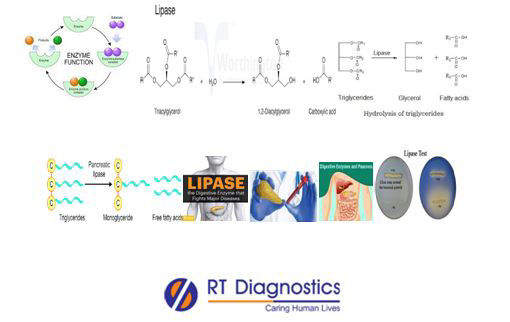Lipase:
Why Lipase Test ?
CLINICAL INFORMATION
The pancreas is a glandular organ that is situated behind the stomach that secretes the digestive juices that empty into the small intestine. Lipases help to absorb fats. Lipases are the digestive enzymes that hydrolyze glycerol esters of long-chain fatty acids into fatty acids and 2-acyl glycerol. The pancreas is the primary source of serum lipase. Hence any pancreatic injury will result in elevated serum lipase levels in the blood and/or other body fluids. Therefore serum lipase aids in the diagnosis of pancreatitis (eg. Acute Pancreatitis) and also in the prognosis (following the efficacy of treatment). Clinical manifestations of pancreatitis include severe abdominal or back pain (Epigastric abdominal pain that may radiate to the back, which gets worsened by ingestion of food), fever, loss of appetite, nausea and/or vomiting etc. The most common causes of pancreatitis are chronic alcoholism (abuse), hypertriglyceridemia, and gall bladder disease.
A lipase test is also monitored in certain other pathological conditions such as gall stones, strangulated or infected bowel (bowel that has restricted blood supply), Pancreatic Cyst, Pseudocyst, Pancreatic Cancer, Cholecystitis (inflammation of the gall bladder), Perforated Ulcer, Severe Gastroenteritis, Duodenal Ulcer, Cystic Fibrosis, Crohn’s Disease, Celiac Disease, Kidney Failure, Alcoholism, Side effects of Medications – eg. Prolonged use of oral contraceptives in women. Additional tests – Tests for pancreatitis other than lipases include CBC, LDH-Lactate Dehydrogenase and Urinary Tests (such as urinary amylase and urinary trypsinogen-2). While another metabolic panel should be considered for prognosis (a guide to assist the treatment) and hence the panels should also include fluid status which includes sodium, potassium, Blood Urea Nitrogen (BUN), creatinine, calcium, glucose, bicarbonate. Other tests include CRP, Procalcitonin, trypsin, interleukin-6, imaging studies like MRI, CT Scan etc.

General Instructions:
Sample Requirement: Specimen - Blood sample collected from the vein. Test Preparation: Fasting Required.
NOTE - Sample for specimen collections may vary based on the patient’s condition/cases according to the patient’s presenting complaints/signs or symptoms:
SPECIMEN REQUIREMENT (Special or Rare Cases) - As instructed and guided by Physician / Clinician / Pathologist / as per Laboratory’s requirements, according to procedures and protocols.
This Multi-Specialty Clinical Referral Laboratory RT DIAGNOSTICS provides precise and accurate tests with an extensive range of testing services to the medical centres to help in the diagnosis and identification of pathology in the test specimens for infectious diseases and also to evaluate the function of organ systems of the patient. It prevents further complications and helps to stabilize and restore health to near normalcy at the earliest without delay.



